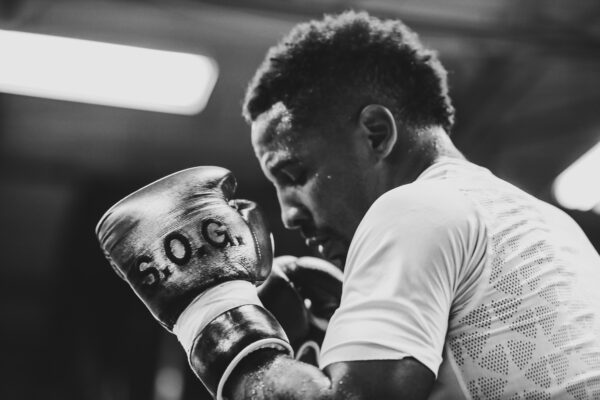This post originally appeared on the Huffington Post.
“Smokin’ Joe”, “Iron Mike”, “PacMan”, “Money”, “Macho Camacho”, “Real Deal”, “Motor City Cobra” … “The Greatest.” Aspiring boxers should choose their nicknames carefully because if they are successful, their handles could follow them for the rest of their lives.
After winning the 2004 Olympic gold medal as a Light Heavyweight, Andre Ward turned pro. Inspired by a verse in the book of Galatians, he dubbed himself: Andre “Son of God” Ward. The moniker doesn’t roll smoothly off the tongue and is an oddity in boxing because it neither suggests impending violence, nor pays homage to the fighter’s hometown. I asked him why he chose it, “It fits.” Ward answered, “I think it is authentic, it is organic and it really speaks to who I am and what I am about.”
Professional athletes and commentators have increasingly used their visibility and cultural capital to make statements and symbolic gestures on social issues during pre-game rituals, post-game interviews and in the interstitial moments in television broadcasts. In 2014, dozens of professional basketball players wore “I Can’t Breath” T-shirts to bring attention to the killing of Eric Garner at the hands of the NYPD. NFL camera crews now scan the sidelines during the national anthem to identify players who decide to kneel, sit, or raise a fist during the song. Most recently, NBA sportscaster Ernie Johnson took two minutes during a pre-game show to deliver his personal, faith-based reaction to Donald Trump’s victory in the presidential election. It went viral in hours.
Given Ward’s history of speaking publicly about his faith, I asked what sort of message he planned to send while occupying boxing’s biggest stage. “I don’t have one polarizing message,” he said “it is just about being consistent over the years. Sometimes the biggest statements you can make are by living something out.”
I wanted to know what Ward would say, he told me to watch how he lives.
The consistency he now reveres was fleeting for Ward and his brother growing up in the Bay Area. A crack cocaine addiction pulled the boys’ mother from their home and left Ward’s father, Frank, with a heavy burden. Ward described his father as a loving man who introduced him to both Christianity and boxing.
To a young Andre Ward, his father was Superman, he was invincible and he was his hero. But Frank Ward was susceptible to his own Kryptonite and like the mythical superhero he would disappear behind closed doors, reappearing transformed.
“I watched this pattern with my dad,” Ward told HBO Sports, “He would be normal in the morning. We would go to school, me and my brother, and he would be normal when we would come home. Tired, but normal. He would spend some time with us, then he would go into his room for about an hour and then he would come out a different person.”
Frank Ward was a Christian, a devoted father and a heroin addict. While those identities are not mutually exclusive, they created inconsistencies that bent but did not break Ward’s love for his father. On Saturday night, Andre Ward will enter the ring with the initials F.W. proudly embroidered on his trunks.
Ward does not want any disconnect between his faith, family and fighting career. His actions in the ring have been the epitome of consistency, he hasn’t lost a match since he was a 12-year-old.
Operating with integrity in the business of professional boxing has posed a more formidable challenge to Ward than the fighters he has faced in the ring. Early in his professional career, he left money on the table when he refused to fight at the Playboy mansion in Los Angeles. His decision infuriated managers and promoters, but Ward did not want his name associated with Playboy.
More recently, Ward spent nearly two years away from boxing because he refused to fight under a contract he believed to be deceptive and unjust. To him the layoff was the price consistency demanded. Tangled in litigation, Ward became the target of criticism from the press, television network executives and fans. Last March, boxing writer Jimmy Tobin predicted the fallout from the fighter’s contract dispute would never fully disappear.
“Spectators will greet Ward with cries of hatred the night he faces Kovalev; even should he win, and there are many reasons to believe he will, those same cries will dog Ward when the fight is over.”
Ward concedes he may have lost some fans who felt he should “know his place” and fight when told. But if he is able to beat the powerful Russian on Saturday night, Ward will be known as the best pound-for-pound boxer in the world.
Ward understands winning fights is important to his legacy. But he argues the success of his boxing career will ultimately be measured by a consistency in character established in the unseen hours of his daily life, not the ephemeral moments captured by the camera.
“I want to be able to look back and say that I stood where I was supposed to stand,” said Ward, “I fought where I was supposed to fight, in the ring and out of the ring.”
Photo credit: Khristopher Sandifer
Andrew Johnson is a contributing fellow with the USC Center for Religion and Civic Culture.








